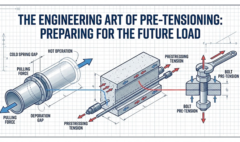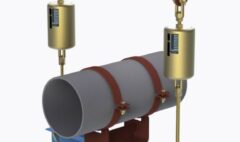The Indispensable Role of Piping Engineering in Modern Industry 🏗️

The Indispensable Role of Piping Engineering in Modern Industry 🏗️
Introduction :
At its core, piping engineering is a specialized discipline that focuses on the design, analysis, installation, inspection, examination and testing of piping systems. These systems are the essential conduits for transporting fluids—liquids, gases, and even solids—from one point to another. While it may sound straightforward, this field is a complex interplay of fluid mechanics, material science, stress analysis, and structural design, ensuring that these vital arteries of our world operate safely, efficiently, and reliably.
The work of a piping engineer is to create a robust and efficient network, considering factors like the nature of the fluid being transported, its temperature and pressure, the surrounding environment, and adherence to stringent safety and design codes, such as those established by the American Society of Mechanical Engineers (ASME).
Scope Across Industries :
- Oil & Gas (Upstream, Midstream, Downstream): This sector is arguably the most prominent example of piping engineering’s critical role. From the moment oil and gas are extracted from deep within the earth (upstream), transported across countries through massive pipelines (midstream), and processed in sprawling refineries (downstream), every step is governed by piping engineering. The design must handle high pressures, extreme temperatures, and corrosive materials, making safety and reliability paramount.
- Chemical & Petrochemical: These facilities are intricate webs of pipes that transport a vast array of raw materials, intermediate products, and finished chemicals, many of which are hazardous or corrosive. The precise and contained movement of these fluids is crucial for the chemical reactions that create countless products we use daily, from plastics to fertilizers.
- Power Generation: In thermal power plants, whether fossil fuel, nuclear, or geothermal, piping engineering is essential for moving high-pressure, high-temperature steam from boilers to turbines to generate electricity. The cooling systems that prevent these plants from overheating are also massive piping networks.
- Pharmaceuticals & Biotechnology: The pharmaceutical industry operates under extremely strict regulations. Piping systems in these facilities must be designed to be completely sterile, prevent any cross-contamination, and allow for thorough cleaning and sterilization, ensuring the purity and safety of life-saving medicines.
- Water & Wastewater Treatment: In the vital sector of Water and Wastewater Treatment, piping engineering forms the foundational circulatory system that makes the entire process of purification and sanitation possible. Its scope is extensive and diverse, covering the journey of water from its raw state to being potable, and the transportation and treatment of wastewater from collection to final discharge or reuse. The primary goal is to design a reliable, durable, and efficient network of pipes that can handle a variety of fluids under different conditions, from clean water to highly corrosive sludge, while adhering to strict public health and environmental regulations.
- Manufacturing: From food and beverage production, which requires hygienic stainless-steel piping to prevent contamination, to semiconductor facilities that need ultra-pure water and specialty gases, manufacturing plants of all types rely on custom-designed piping systems to support their processes.







